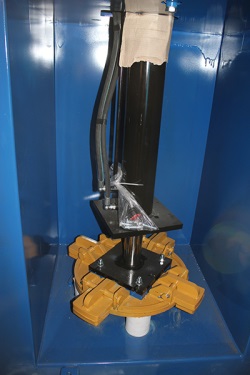Russia's Atomenergomash has developed a unique mobile facility for processing low-level waste (LLW).
Atomenergomash, the equipment manufacturing and engineering division of state nuclear corporation Rosatom, said in a statement yesterday that one its subsidiaries had completed the development and manufacture of the equipment and containers of a mobile unit designed to process LLW for its customer RosRAO.
 |
| Mobile LLW processing unit (Image: SverdNIIkhimmash) |
Moscow-based RosRAO, another Rosatom subsidiary, began operations in 2009 for the management of used nuclear fuel, non-nuclear radioactive waste, and decommissioning services, especially of submarines. Then in 2011, NO RAO was created to consolidate these activities as the national manager of Russia's used nuclear fuel and radioactive waste. RosRAO aims to be a global provider of back-end fuel cycle services.
Sergey Semin, head of project design and technology at RosRAO, said that LLW accounts for most of the volume of waste connected to the decommissioning of Russia's nuclear facilities. RosRAO was thus tasked with finding a way to reduce the volume of LLW. The results of the unit's operations in 2015 will determine any decision on the feasibility of reproducing and using such a system at other nuclear facilities, Semin said.
The pilot unit - made by Ekaterinburg-based SverdNIIkhimmash - aims to increase the efficiency of future nuclear waste management operations, Atomenergomash said.
One of the key features of the "first of its kind" unit is that once placed in mobile containers, it can be "quickly deployed and start processing without the need for extensive preparatory work", Dmitry Kukiev, head of research at SverdNIIkhimmash, said. LLW processing "will be done on the spot, without the need for transport," he added.
The unit is expected to help reduce the volume of LLW by 2-3 times and process about 250 cubic meters of radioactive waste a year. It will be launched by the Urals branch of RosRAO once all the required permits have been obtained, Atomenergomash said.
Researched and written
by World Nuclear News




_13505.jpg)
_87975.jpg)
_67826.jpg)
_87695.jpg)





